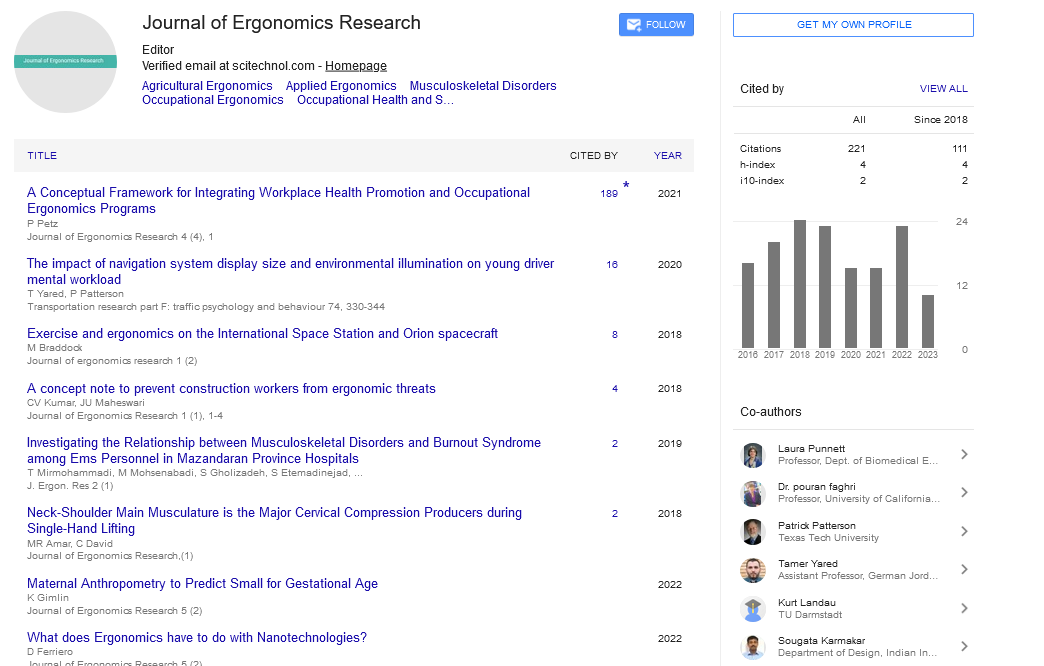Opinion Article, J Ergon Res Vol: 6 Issue: 1
Importance of User-Centered Design in Human-Computer Interactions
Alkath Kauri*
1Department of Cybersecurity, University of Jeddah, Jeddah, Saudi Arabia
*Corresponding Author: Alkath Kauri
Department of Cybersecurity, University of
Jeddah, Jeddah, Saudi Arabia
E-mail: alkathkauri@gmail.com
Received date: 20-Feb-2023, Manuscript No. JEOR-23-93685;
Editor assigned date: 22-Feb-2023, PreQC No. JEOR-23-93685(PQ);
Reviewed date: 09-Mar-2023, QC No JEOR-23-93685;
Revised date: 16-Mar-2023, Manuscript No. JEOR-23-93685(R);
Published date: 23-Mar-2023, DOI: 10.4172/ Jeor.1000119.
Citation: Kauri A (2023) Importance of User Centered Design in Human-Computer Interactions. J Ergon Res 6:1.
Description
Human-Computer Interaction (HCI) is a field of study that focuses on the design, implementation, and evaluation of interactive systems that are intended to facilitate communication between humans and computers. The goal of HCI is to provide interfaces that are userfriendly, efficient, and effective for a variety of users, including those with disabilities. As computing technology became more sophisticated, began to explore ways to improve the user experience.
Current trends in HCI
Today, HCI continues to evolve as new technologies emerge and users’ needs change. Some of the current trends in HCI include:
Mobile computing with the rise of smartphones and tablets, researchers are exploring ways to design interfaces that are optimized for mobile devices.
Wearable technology wearable devices such as smart-watches and fitness trackers are becoming increasingly popular, and researchers are exploring ways to design interfaces that are intuitive and effective for these devices.
Augmented and virtual reality augmented and virtual reality technologies are becoming more sophisticated, and researchers are exploring ways to design interfaces that are immersive and intuitive for these environments.
Natural language processing with the rise of virtual assistants such as Siri and Alexa, researchers are exploring ways to design interfaces that are optimized for natural language processing.
Design principles in HCI
There are several key design principles that are used in HCI to provide effective and user-friendly interfaces.
Usability-Interfaces should be easy to use and learn, and should allow users to complete tasks efficiently.
Accessibility interfaces should be designed to accommodate users with disabilities, such as visual or hearing impairments.
Consistency interfaces should be consistent in their design and layout, to minimize confusion and increase efficiency.
Feedback interfaces should provide feedback to users, to let them know when a task has been completed or if an error has occurred.
Error prevention and recovery interfaces should be designed to prevent errors from occurring, and to provide users with a way to recover from errors that do occur.
Challenges in HCI
Despite the many advances in HCI, there are still several challenges that must be addressed. Some of these challenges include:
Designing for diverse users HCI must design interfaces that are effective for users with a wide range of abilities, backgrounds, and needs.
Balancing usability and security interfaces must be designed to balance the need for security with the need for usability, to ensure that users can complete tasks efficiently while also protecting their data.
Keeping up with technological advances HCI researchers must stay up-to-date with the latest technological advances, in order to design interfaces that are optimized for new devices and technologies.
Conclusion
HCI research is a critical component of providing effective and userfriendly interfaces for computers and other interactive systems. By focusing on usability, accessibility, consistency, feedback, and error prevention and recovery, HCI researchers can produce interfaces that are intuitive, efficient, and effective for a wide range of users. Despite the many challenges that must be addressed, HCI research continues to evolve and improve, as new technologies emerge and users’ needs change.
 Spanish
Spanish  Chinese
Chinese  Russian
Russian  German
German  French
French  Japanese
Japanese  Portuguese
Portuguese  Hindi
Hindi 